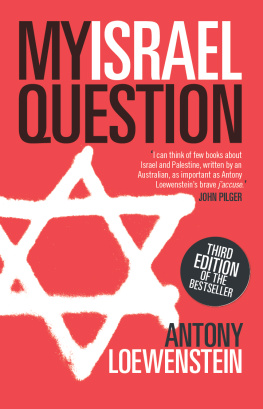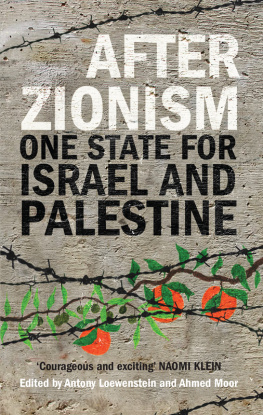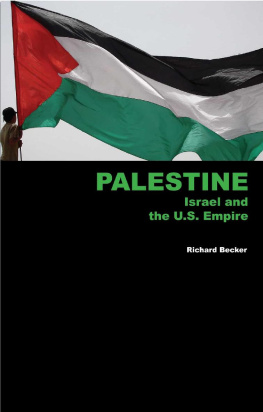ROUTLEDGE LIBRARY EDITIONS: ISRAEL AND PALESTINE
Volume 14
ZIONISM AND ARABISM IN PALESTINE AND ISRAEL
Zionism and Arabism in Palestine and Israel
Edited by
Elie Kedourie and Sylvia G. Haim
First published in 1982
This edition first published in 2015
by Routledge
2 Park Square, Milton Park, Abingdon, Oxon, OX14 4RN
and by Routledge
711 Third Avenue, New York, NY 10017
Routledge is an imprint of the Taylor & Francis Group, an informa business
1982 Frank Cass & Co. Ltd.
All rights reserved. No part of this book may be reprinted or reproduced or utilised in any form or by any electronic, mechanical, or other means, now known or hereafter invented, including photocopying and recording, or in any information storage or retrieval system, without permission in writing from the publishers.
Trademark notice : Product or corporate names may be trademarks or registered trademarks, and are used only for identification and explanation without intent to infringe.
British Library Cataloguing in Publication Data
A catalogue record for this book is available from the British Library
ISBN: 978-1-138-89267-5 (Set)
eISBN: 978-1-315-69513-6 (Set)
ISBN: 978-1-138-90517-7 (Volume 14)
eISBN: 978-1-315-69536-5 (Volume 14)
Publisher's Note
The publisher has gone to great lengths to ensure the quality of this reprint but points out that some imperfections in the original copies may be apparent.
Disclaimer
The publisher has made every effort to trace copyright holders and would welcome correspondence from those they have been unable to trace.
ZIONISM AND ARABISM IN PALESTINE AND ISRAEL
Edited by
ELIE KEDOURIE
and
SYLVIA G. HAIM
First published 1982 in Great Britain by
FRANK CASS AND COMPANY LIMITED
Gainsborough House, 11 Gainsborough Road, London, E11 IRS, England
and in the United States of America by
FRANK CASS AND COMPANY LIMITED
c/o Biblio Distribution Centre 81 Adams Drive, P.O. Box 327, Totowa, N.J. 07511
Transferred to Digital Printing 2004
Copyright 1982 Frank Cass & Co. Ltd.
British Library Cataloguing in Publication Data
Zionism and Arabism in Palestine and Israel.
1. Palestine - Politics and government
I. Kedourie, Elie
II. Haim, Sylvia G
956.94'04 DS126
ISBN 0-7146-3169-8
All rights reserved. No part of this publication may be reproduced, stored in a retrieval system, or transmitted in any form, or by any means, electronic, mechanical, photocopying, recording, or otherwise, without the prior permission of Frank Cass and Company Ltd.
Typeset by Computacomp (UK) Ltd, Fort William, Scotland
Contents
| Neil Caplan |
| Shai Lachman |
| Thomas Mayer |
| Aaron S. Klieman |
| Joseph Heller |
| Allen H. Podet |
| Amitzur Ilan |
| Yaacov Ro'i |
| Ibrahim A. Gambari |
| Yael Yishai |
The ten studies published in this volume were submitted, and accepted, for publication in Middle Eastern Studies. But it has seemed to the Editors that these studies, tackling as they do various issues stemming from the long drawn out conflict between Arabism and Zionism before and after the establishment of Israel, form a coherent collection and could, with advantage, be published together - hence the present volume. The studies fall into a number of well-defined groups. The first three chapters reconsider aspects of Arab-Jewish relations and the Arab struggle against Zionism from the arrival of Sir Herbert Samuel in Palestine until the end of the Mandate. New light is here thrown on Zionist attitudes to the Arab question, on the beginnings of the Arab armed struggle against the Mandate and Jewish settlement, and on the character of the intervention by the Muslim Brethren in the affairs of Palestine during the last years of the Mandate.
The next four chapters are concerned with the diplomatic events and the political decisions leading to the abandonment of the Mandate by Great Britain. Here, too, issues are raised and questions posed which stimulate thought and give rise to further questions.
Chapters eight and nine relate to the diplomatic history of Israel and of the Arab-Israeli conflict. They illustrate how the Palestine question, from being a relatively local and minor question at its beginnings, now has multifarious and world-wide ramifications.
Finally, the last chapter deals with an aspect of the political and economic life of town Arabs of Palestine who, through the accident of war, now find themselves Israeli citizens.
E.K
S.G.H
Due to the high cost of printing, it has been decided to eliminate diacritical marks in transliteration, except in a few cases where ambiguity could arise.
Neil Caplan
In recent years, the use of unpublished British and Zionist archive material has produced a number of interesting and detailed studies of British Palestine policy and the early development of the Zionist-Arab conflict. Sir Herbert Samuel, first High Commissioner to Palestine (1920-25) and a Jew, has been the subject of scholarly articles by Elie Kedourie and Bernard Wasserstein. The present article seeks to complement the existing literature on Samuel by exploring in more detail the reactions of the Yishuv (Jewish community of Palestine) to his chosen style and methods of governing Palestine during his term of office.
While Herbert Samuel often differed with official Zionist spokesmen, like Chaim Weizmann, the clash between him and local Palestinian Jews was more pronounced. Jews on the spot were hardly as subtle or sophisticated as either Samuel or Zionist leaders from England, Europe or America. Showing little patience for diplomatic niceties, Yishuv leaders preferred a direct approach to most questions, perceiving and advancing their political and communal interests with single-minded tenacity. The Jews of Palestine saw themselves as a beleaguered minority endowed with historic rights, but without the strength to protect those rights from a hostile native population. Hence, during the period of the mandate they persisted in demanding from British rulers of the country a degree of active sympathy which went far beyond the latter's proclaimed 'equality of obligation' to both Jews and Arabs.
In a sense, the differences between the Yishuv and Sir Herbert Samuel were not unlike today's gap between local Israeli attitudes and those of influential Jewish friends from abroad who would suggest solutions to the Arab-Israeli dispute. The Yishuv disagreed sharply with those who, like Samuel, sought 'liberal' solutions to the Palestine conflict. Although approaches to the 'Arab question' varied among the diverse elements within the Yishuv, Samuel's policies which aimed at conciliating and reassuring the Arabs of Palestine were contrary to almost all of the 'local wisdom' on the question of how to deal with Arab hostility to the Jewish National Home.












